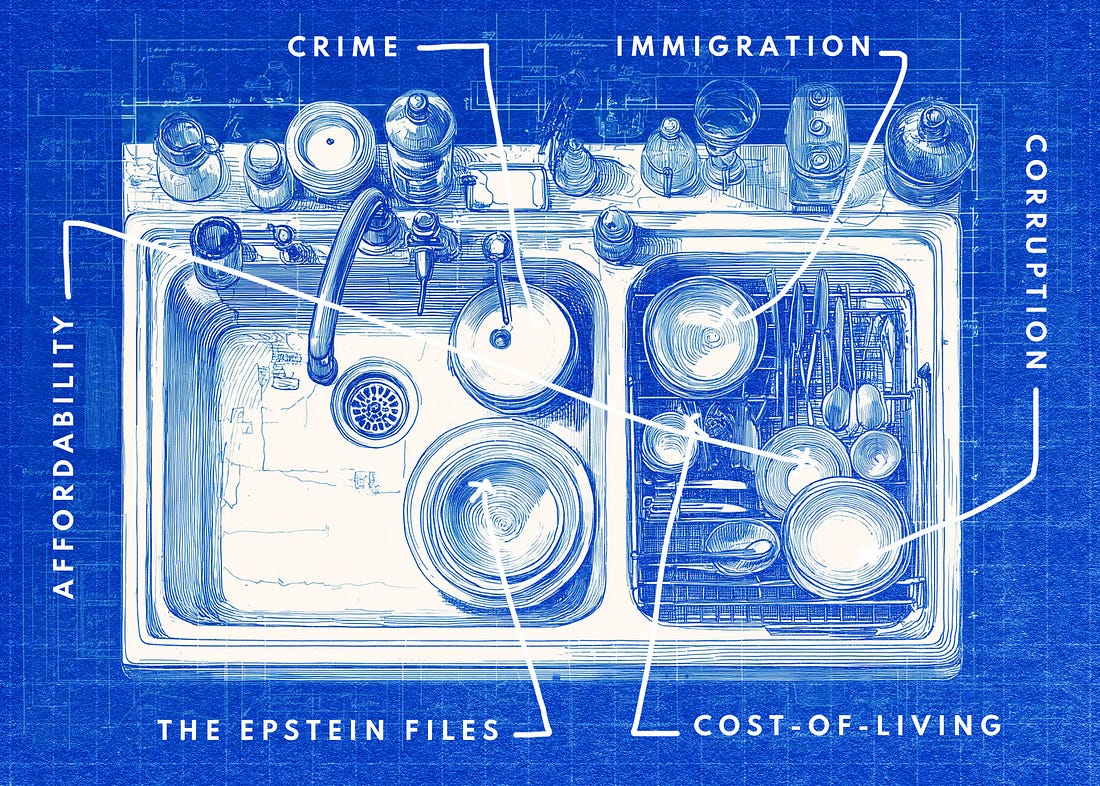|
 |
Hi, y’all. Welcome back to The Opposition. Democratic officials were buzzing with optimism this morning after a new NPR/PBS/Marist poll dropped showing the party held a 14-point lead against Republicans among registered voters on the 2026 generic congressional ballot—the largest advantage that Democrats have had since 2017. Add that on top of the off-year election results earlier this month and the vote this week on the Jeffrey Epstein files, and it’s safe to say Democrats are feeling like they might finally be getting their footing.
But the Epstein vote wasn’t always guaranteed to happen. Some Democratic members were initially skeptical that there was a political benefit to pursuing the files, worrying that it would detract from the party’s core message of affordability. Today’s newsletter is focused on that debate within the party about whether such a narrow focus on the cost of living is the right way to approach the midterms.
Enjoy this newsletter? Sign up for Bulwark+. You’ll get access to all our locked content, you can hop into the comments sections, and you’ll have the satisfaction of knowing you’re supporting journalism like this:
–Lauren
Throw Everything at the Wall
After the Epstein vote, Dems debate shifting from just ‘kitchen table’ issues to an ‘even the kitchen sink’ approach.
OVER THE LAST YEAR, much of the Democratic party clung to the belief that the path back to power would require a monomaniacal focus on affordability.
In podcast interviews and cable-news appearances, party officials religiously pivoted to talking points about groceries being more expensive, utility bills skyrocketing, and health care being ripped away from millions of people. The idea that kitchen-table issues will deliver congressional majorities in 2026 has become such a doctrine within the party that in certain quarters it’s now considered not only unwise but even gauche to run on anything else. The supporters of this approach see vindication in the results of this month’s elections, as Mikie Sherrill and Abigail Spanberger both ran their gubernatorial campaigns with a major focus on economic issues.
Then this week happened.
Democrats broke from their laser-like focus on affordability and rallied behind legislation that would force the Justice Department to release all files it has on Jeffrey Epstein. And it worked. Not only did the bill pass both chambers of Congress, but it fractured the Republican coalition in the process, putting Trump in a position he hadn’t yet been in during this second term: lacking control over his party. The president will now sign a bill that will, at the very least, serve as a public reminder of his friendship with a human trafficker and sex offender.
No one I talked to in Democratic circles over the past week said they believe that the Epstein saga would now be the determinative electoral factor in 2026. But the disruption it has caused—and the momentum it provided to their party—has sparked a type of reimagining of the playbook for taking on Trump. At a minimum, it has strengthened the argument of those convinced that the party, instead of strictly focusing on affordability, should throw everything at the White House to see what sticks.
“There’s stuff you can run on to show what you’re for and there’s also a really easy way to show what you’re against. Dems have to do both,” said Democratic strategist Rebecca Katz. “The real challenge is how much bad news there is and figuring out which pieces to hit.”
IT’S BEEN LOST IN THE DRAMA of this week’s votes, but it wasn’t that long ago that congressional Democrats weren’t unified in supporting an all-in strategy for demanding Epstein disclosures. In an interview with CNN this week, Rep. Ro Khanna (D-Calif.), the main cosponsor of the discharge petition and the lead sponsor of the resolution that forced the release of the files, said that when he first introduced the resolution over the summer, it was hard to get his party on board.
“I’m not going to say who, but some of the folks in our own party were like, eyerolls, ‘There goes Ro on one of his issues. . .’ ‘Why aren’t we talking about the price of eggs?’ ‘Why aren’t we talking about the price of health care?’ ‘What’s up with this?’ And I said, ‘No, there is something legitimate here.’”
Khanna was referencing the Democrats’ perpetual internal conversation about whether the party has allowed itself to routinely be distracted by the Trump scandal du jour. Over the summer, as the party was trying to go after Trump’s tax-and-spending bill, lawmakers warned that the Epstein story was a “distraction” from the issues that Really Mattered.
But other Democrats—not just Khanna—argued that the party had to do both: focus on cost-of-living issues while also going after Trump on his missteps, corruption, and malfeasance. Modern politics, this faction argued, demands nimbleness in response to events; and it certainly requires engaging in those stories that, while maybe ephemeral, grab people’s attention in the moment. That meant putting out TikTok videos about Tom Homan’s alleged Cava-bag bribery payment in addition to releasing yet another statement on rising costs. A balanced political diet.
Prominent among those making that argument was former Chicago mayor (and likely 2028 presidential candidate) Rahm Emanuel, whose February opinion piece for the Washington Post was an important touchstone in the debate. While it’s understandable, he wrote, that Democrats want to “narrow their definition of kitchen-table issues,” he reminded his readers that Americans discuss much more than how to stretch the family budget over dinner, and called on Democrats to talk more about crime and immi
